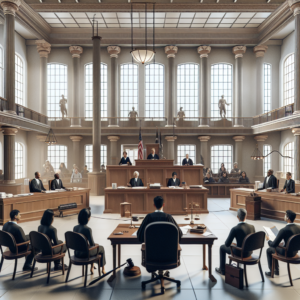Unveiling Scandals: The Shocking Truth Behind High-Profile Arrests
In recent years, high-profile arrests have become a focal point of public discourse, often revealing the darker undercurrents of fame and fortune. These incidents not only captivate audiences but also raise questions about the interplay between celebrity culture, the legal system, and media representation. As society grapples with the implications of these arrests, it is essential to understand the context, legal framework, and the broader societal reactions that accompany such scandals.
Understanding the Context: High-Profile Arrests in the Public Eye
High-profile arrests often occur within a unique context that amplifies their significance. Celebrities, athletes, and public figures are not just individuals; they are brands with substantial influence over public opinion and culture. When these figures are arrested, the ramifications extend beyond their personal lives, affecting fans, industries, and even societal norms. The public's fascination with the lives of the rich and famous means that these incidents are scrutinized intensely, leading to a complex interplay of shock, outrage, and sometimes even sympathy. This heightened attention can also lead to a rush to judgment, where public opinion is formed before all facts are known, creating a volatile environment that can impact the legal proceedings that follow.
The Legal Framework: How Arrests of Celebrities Differ from Ordinary Cases
The legal framework surrounding high-profile arrests often diverges significantly from that of ordinary cases. Celebrities may benefit from resources that allow them to mount robust legal defenses, including high-profile attorneys and public relations teams. Additionally, the media's constant scrutiny can lead to a phenomenon known as "trial by media," where public opinion can influence judicial processes. Furthermore, the legal system may also treat these cases differently due to the potential for greater public interest and the implications for the justice system's credibility. This disparity raises ethical questions regarding fairness and equality under the law, as the outcomes of high-profile cases can set precedents that affect future legal proceedings.
Case Studies: Notable High-Profile Arrests That Shook the Nation
Several high-profile arrests have left indelible marks on the national consciousness, serving as case studies for the complexities involved. One such case is that of actress Felicity Huffman, who was implicated in a college admissions scandal that exposed the lengths to which some wealthy families would go to secure educational advantages for their children. Her arrest and subsequent guilty plea highlighted issues of privilege and inequality in the education system. Similarly, the arrest of former NFL star Aaron Hernandez for murder not only shocked fans but also ignited discussions about mental health, violence, and the pressures faced by athletes. Each of these cases serves as a lens through which society can examine broader issues, including systemic inequalities and the moral responsibilities of public figures.
Media Influence: The Role of Journalism in Shaping Public Perception
The media plays a pivotal role in shaping public perception of high-profile arrests, often acting as both informant and influencer. Sensational headlines, in-depth investigative reports, and continuous coverage can create a narrative that influences how the public perceives the accused. The media's portrayal can lead to a polarized public opinion, where individuals are either vilified or defended based on the information presented. This dynamic can complicate the legal process, as jurors may be influenced by pre-trial coverage, and public sentiment can sway the outcomes of cases. Moreover, the ethical responsibilities of journalists come into question, as the line between reporting facts and sensationalizing stories can become blurred, impacting the integrity of the judicial process.
Behind the Scenes: Investigating the Factors Leading to High-Profile Arrests
Understanding the factors that lead to high-profile arrests requires a multifaceted approach. Often, these incidents are rooted in a combination of personal choices, systemic issues, and societal pressures. For instance, the lifestyle of celebrities, characterized by excess and scrutiny, can lead to risky behaviors that attract legal trouble. Additionally, systemic issues such as socioeconomic disparities, mental health challenges, and the pressures of fame can contribute to a perfect storm for legal issues. Investigating these factors reveals that high-profile arrests are rarely isolated incidents; they are often symptomatic of larger societal problems that warrant deeper examination and dialogue.
The Aftermath: Legal Consequences and Public Reactions to Scandals
The aftermath of high-profile arrests often involves a complex web of legal consequences and public reactions. For the individuals involved, the repercussions can range from legal penalties, such as fines and imprisonment, to long-lasting damage to their careers and reputations. Public reactions can vary widely, with some individuals facing backlash and others receiving support from loyal fans. The societal implications of these reactions can also be profound, as they often reflect broader cultural attitudes toward justice, accountability, and redemption. As public figures navigate the fallout from their arrests, they must contend with the dual challenge of addressing legal obligations while managing public perception, which can be a daunting task in the age of social media.
High-profile arrests serve as a mirror reflecting the complexities of fame, justice, and societal values. As public figures navigate the legal system under the watchful eyes of the media and the public, the implications of their actions resonate far beyond their personal lives. Understanding the context, legal nuances, and societal reactions surrounding these incidents is crucial for fostering informed discussions about justice, accountability, and the responsibilities of those in the public eye. As we continue to witness these scandals unfold, it becomes increasingly important to engage critically with the narratives that shape our understanding of justice and celebrity culture.
